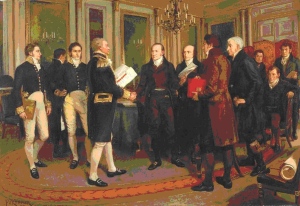Cities get many reputations, some of them undeserved. Their names can become characterised — often tarnished — for reasons out of their control. It was not the city’s fault that the congress in Vienna or treaty in Versailles were each blamed for subsequent European wars, and there is not an anti-EU movement across Europe that has not roundly condemned the Treaty of Rome, or global warming foes who bemoan the saggy green liberalism of ‘Kyoto’. The Treaty of Brest-Litovsk was so ineffectual that it lasted less than nine months. Before ‘Sony Pictures’, ‘Munich’ was the epitome of caving in to aggression for a craven quiet life, simply putting off the moment when the toughest decisions have to be made.
Paris has hosted so many peace treaties that it is immune from being singled out for any one failure (M. Hollande excepted, of course). Paris is a pleasant enough European city, now living out its decline. At one time was one of the great centres of diplomacy. That and the après conference nightlife made it a popular choice for weeks of endless treaty wrangling. Its battle honours in peace treaties began way back in the year 1259, sorting out the war between the French and English, followed somewhat perfidiously in the summer of 1295 when the Scots and the French signed a treaty to gang up on the English. The American War of Independence and the Crimean War were ended with ink on parchment in Paris and latterly the Paris Peace Accords in 1973 ceased the Vietnam War.
Ghent, on the other hand, has not been much of a go-to town for peace fests. Treaty of Ghent, you say? Never heard of it? Probably because it concluded a pointless war that neither side really wished for and was subsequently ignored in European accounts of world history. It was a treaty which put all the toys back in the box exactly where they had been before the squabbling began. It was the treaty of Ghent in 1814 which ended the aimless War of 1812 between England and America. It was signed this day 200 years ago.

Napoleon’s plan for European domination had only just been thwarted (though like Schwarzenegger’s Terminator, Napoleon would be back for another final go the following year). This and the fact that France had been implicated in some of the background to the 1812 war ruled out Paris. Nowhere on the North American continent felt neutral enough as a venue. And as most of Europe had been a war zone for a decade, treaty negotiators wanted somewhere that, if things became dangerous, it wasn’t too far to the coast and a ship to safety. So Ghent got the nod.
Before the arm wrestling over clauses, the British privately asked the Duke of Wellington whether a war was even winnable. Fearing that he would be asked to take charge and not wishing to become a second Cornwallis, he advised settling. For the rest of the century though, Little Englanders, bemoaned the shame it brought upon the nation and particularly the navy. It was still being called a “policy of feeble compromise and weak surrender” in 1900.
By the way, the tenth article of the treaty is an eye opener.
“Whereas the Traffic in Slaves is irreconcilable with the principles of humanity and Justice, and whereas both His Majesty and the United States are desirous of continuing their efforts to promote its entire abolition, it is hereby agreed that both the contracting parties shall use their best endeavours to accomplish so desirable an object.”
It is a ‘best endeavours’ clause (which lawyers will know is something of a cop out signifying ‘I’ll do it if I can, but don’t count on it any time soon’). And when it outlaws ‘traffic in slaves’ it was only meant to be understood to mean international transportation of newly captured people from Africa rather than domestic buying and selling of people. In the US that latter part was glossed over, debated over, argued over, seceded over and eventually fought over.

Reblogged this on First Night History.